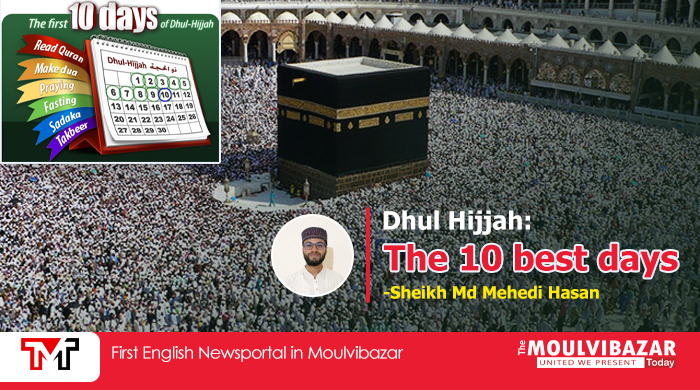
Dhul Hijjah: The 10 best days
 The month of Dhul Hijjah is one of the holiest periods of the Islamic year, SubhanAllah. A month of increased spirituality, we witness two very special events (Hajj and Eid ul Adha) – all in devotion to Allah (SWT).
The month of Dhul Hijjah is one of the holiest periods of the Islamic year, SubhanAllah. A month of increased spirituality, we witness two very special events (Hajj and Eid ul Adha) – all in devotion to Allah (SWT).
Many people don’t know that the first ten days of Dhul Hijjah are better than all the other days of the year, the 10 best days with no exception. They are even better than the days of Ramadan, SubhanAllah!
Prophet Muhammad said:
There are no days on which righteous deeds are more beloved to Allah than these ten days
Hadith |
these beloved 10 days of Dhul Hijjah offers another chance to gain immense rewards, have our sins forgiven and reach great levels of piety, Insha’Allah.
A month of increased spirituality, we witness two very special events – all in devotion to Allah (SWT).
Not only is this the month of Hajj, but also the blessed day of Eid al-Adha.
On this day, each and every one of us, who is able to, must offer a Qurbani – just as Prophet Ibrahim (AS) did – in devotion to Allah (SWT) and to help vulnerable communities in need across the globe, including right here in the UK.
Benefits of Dhul Hijjah
The first ten days of Dhul Hijjah are often referred to as the best ten days of the year, and a second chance after Ramadan. For those of us not performing the Hajj pilgrimage this year, this is still a great time of blessing and immense reward.
Our hearts and prayers are with those undertaking the holy pilgrimage of Hajj during these days. While many of us are unable to make the blessed journey this year, there are still many ways for us to reap the blessings of this month.
By the dawn; And [by] the ten nights.
Qur'an | 89:2
According to many scholars of the Qur’an, the days mentioned as significant enough for Allah to swear by them are the first ten days of Dhul-Hijjah.
Whoever is not able to go to Hajj should use this blessed time to complete even more righteous deeds than usual. These can include anything such as giving charity, honoring one’s parents, upholding the ties of kinship, and enjoining what is good and forbidding what is evil.
It is also important to enhance our obligatory acts of worship by being mindful of our prayers and ensuring we pay our Zakat on time.
For those of us who have not yet completed the pilgrimage of Hajj, this is an ideal time to make Du’a that Allah grants us the opportunity to do so soon. Fasting and remembrance are particularly recommended.
The Prophet used to fast on the first nine days of Dhul-Hijjah and the day of Ashura, and three days each month, the first Monday of the month and two Thursdays.
Hadith |
Remembrance
Our Prophet said: “There are no days that are greater before Allah or in which good deeds are more beloved to Him, than these ten days, so recite a great deal of tahleel, takbeer and tahmeed during them(Ahmad) are no days that are greater before Allah or in which good deeds are more beloved to Him, than these ten days, so recite a great deal of tahleel, takbeer and tahmeed during them(Ahmad)
Tahmeed: Al-hamdu Lillah.
Tahleel: Laa ilaha ill-Allah.
Tasbeeh: Subhaan-Allah.
While there are different versions, the takbeer can also be recited as follows:
Allahu akbar, Allahu akbar, laa ilaaha ill-Allah, Allahu akbar, wa Lillaah il-hamd.
By giving in this blessed month, we offer crucial solidarity and hope. Dhul Hijjah is a sacred month loved by Allah.
Writer:
Sheikh Md Mehedi Hasan
Islamic Speaker: NTV & Bangla Vision.
Syed Mujtaba Ali Road, Moulvibazar-3200